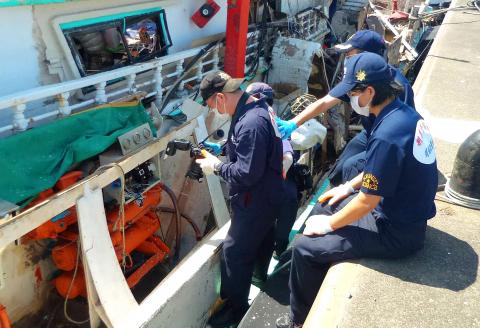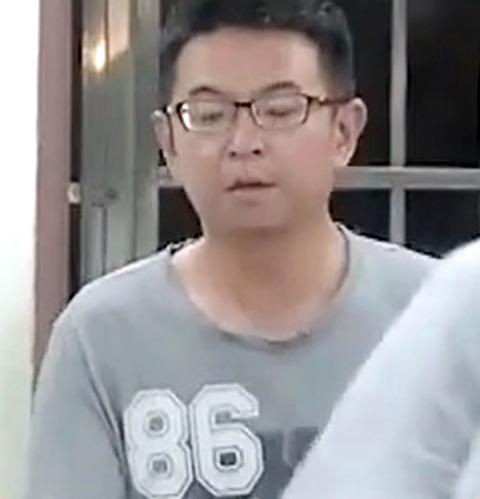Prosecutors and investigators yesterday inspected the damaged Taiwanese fishing vessel Hsiang Li Sheng (翔利昇), which was hit by a Hsiung Feng III missile in the Taiwan Strait on Friday and called on a leading missile expert to provide technical information as a judicial probe into the missile’s launch continued.
After overnight questioning on Friday by the Kaohsiung District Prosecutors’ Office, second-class petty officer Kao Chia-chun (高嘉駿) and chief petty officer Chen Ming-hsiu (陳銘修), the navy officers allegedly responsible for the missile’s launch, were both released yesterday morning after posting bail of NT$300,000.
The junior officers were listed as defendants following the death of Huang Wen-chung (黃文忠), the captain of the Hsiang Li Sheng, who died when the missile struck the vessel.

Photo: CNA
The two men are to be charged with professional negligence causing death, prosecutors said, adding that they would also be charged under the Criminal Code of the Armed Forces (陸海空軍刑法) for the destruction of military property.
Kao and Chen’s superior officers on the Chinchiang corvette, Lieutenant Commander Lin Po-tse (林伯澤) and Lieutenant Junior Grade Hsu Po-wei (許博為) — who was responsible for the ship’s weapons systems — were also detained for questioning and later released pending further investigation.
Meanwhile, the Ministry of Justice has formed a prosecutors’ task force to look into the incident.

Photo: Huang Chien-hua, Taipei Times
Taiwan High Prosecutors’ Office Director-General Wang Tien-sheng (王添盛) traveled to Kaohsiung to lead the investigation.
Wang and his task force brought in a leading missile scientist from the National Chungshan Institute of Science and Technology (CSIST), the nation’s top military research center, which developed the supersonic “aircraft carrier killer” Hsiung Feng III missile.
The CSIST scientist, who has not been named to protect his identity, provided information on the missile’s operation and functioning, its system specifications and other technical data, to aid in the investigation.
Wang yesterday led a team of prosecutors and investigators aboard the Hsiang Li Sheng for further examination and to search for evidence after the boat was towed to the Shinda Harbor (興達港) in Kaohsiung’s Cieding District (茄萣).
Following yesterday’s examination, prosecutor Liu Chun-liang (劉俊良) announced the preliminary findings of the investigation.
“The damage to the ship was consistent with an impact by a highly mobile projectile traveling at a very rapid velocity,” he said, adding that there was no sign of destruction by an ordnance explosion.
“Based on evidence and trajectory studies, the projectile struck the ship from the bow direction, to the right of the pilot’s section, and it exited in the stern on the left side,” he said, giving a revised picture from initial reports on Friday.
An examination of Huang’s body by pathologists and prosecutors indicated that he sustained a fatal head wound, likely on impact from the missile.
The prosecutors’ task force also said it would investigate possible leaks of classified information, or if there were military personnel acting as “informants” to Chinese Nationalist Party (KMT) Policy Committee executive director Alex Tsai (蔡正元) during the missile incident, as Tsai appeared to have knowledge of the incident before it was confirmed by Premier Lin Chuan (林全) on Friday morning.
Prosecutors said the matter has serious implications for national security and must be investigated to find out if there was any illegal conduct.

CHAOS: Iranians took to the streets playing celebratory music after reports of Khamenei’s death on Saturday, while mourners also gathered in Tehran yesterday Iranian Supreme Leader Ayatollah Ali Khamenei was killed in a major attack on Iran launched by Israel and the US, throwing the future of the Islamic republic into doubt and raising the risk of regional instability. Iranian state television and the state-run IRNA news agency announced the 86-year-old’s death early yesterday. US President Donald Trump said it gave Iranians their “greatest chance” to “take back” their country. The announcements came after a joint US and Israeli aerial bombardment that targeted Iranian military and governmental sites. Trump said the “heavy and pinpoint bombing” would continue through the week or as long

TRUST: The KMT said it respected the US’ timing and considerations, and hoped it would continue to honor its commitments to helping Taiwan bolster its defenses and deterrence US President Donald Trump is delaying a multibillion-dollar arms sale to Taiwan to ensure his visit to Beijing is successful, a New York Times report said. The weapons sales package has stalled in the US Department of State, the report said, citing US officials it did not identify. The White House has told agencies not to push forward ahead of Trump’s meeting with Chinese President Xi Jinping (習近平), it said. The two last month held a phone call to discuss trade and geopolitical flashpoints ahead of the summit. Xi raised the Taiwan issue and urged the US to handle arms sales to

BIG SPENDERS: Foreign investors bought the most Taiwan equities since 2005, signaling confidence that an AI boom would continue to benefit chipmakers Taiwan Semiconductor Manufacturing Co’s (TSMC, 台積電) market capitalization swelled to US$2 trillion for the first time following a 4.25 percent rally in its American depositary receipts (ADR) overnight, putting the world’s biggest contract chipmaker sixth on the list of the world’s biggest companies by market capitalization, just behind Amazon.com Inc. The site CompaniesMarketcap.com ranked TSMC ahead of Saudi Aramco and Meta Platforms Inc. The Taiwanese company’s ADRs on Tuesday surged to US$385.75 on the New York Stock Exchange, as strong demand for artificial intelligence (AI) applications led to chip supply constraints and boost revenue growth to record-breaking levels. Each TSMC ADR represents

State-run CPC Corp, Taiwan (CPC, 台灣中油) yesterday said that it had confirmed on Saturday night with its liquefied natural gas (LNG) and crude oil suppliers that shipments are proceeding as scheduled and that domestic supplies remain unaffected. The CPC yesterday announced the gasoline and diesel prices will rise by NT$0.2 and NT$0.4 per liter, respectively, starting Monday, citing Middle East tensions and blizzards in the eastern United States. CPC also iterated it has been reducing the proportion of crude oil imports from the Middle East and diversifying its supply sources in the past few years in response to geopolitical risks, expanding